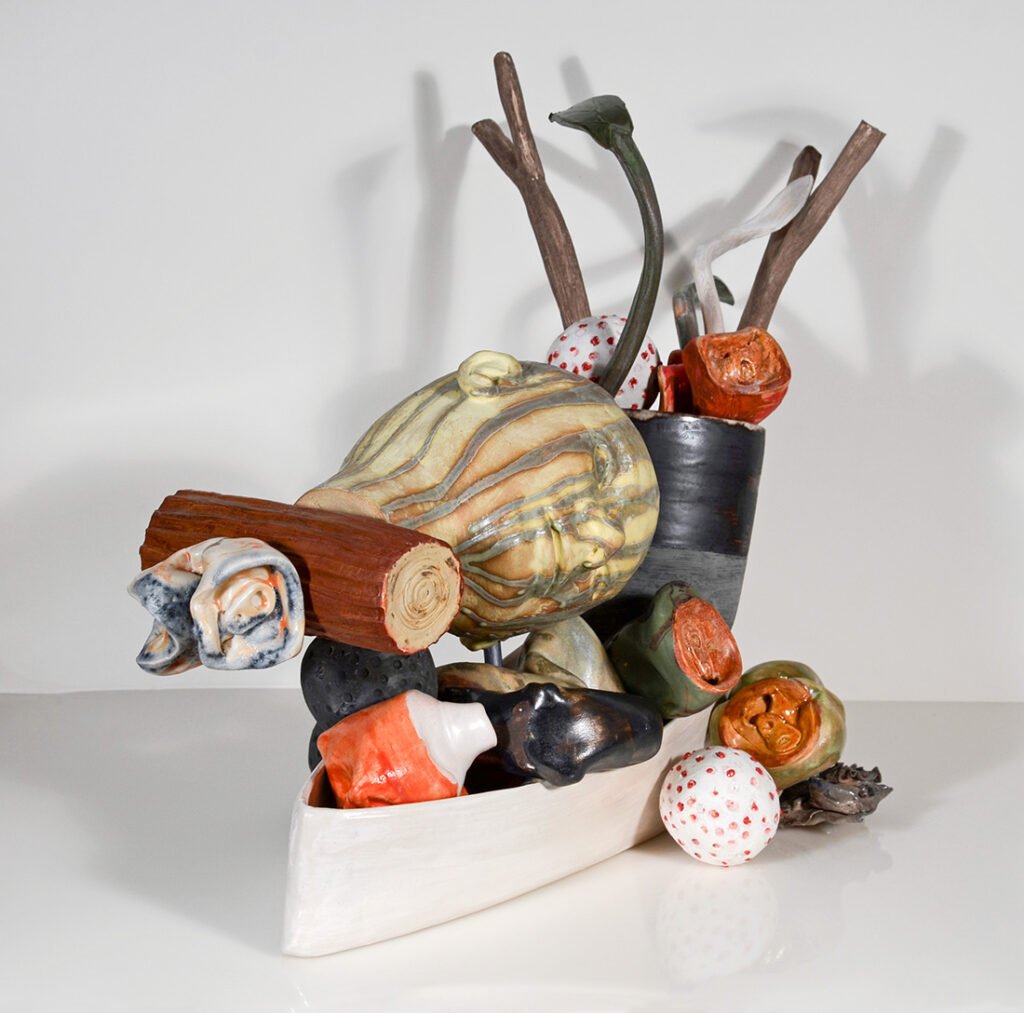
all consuming
all consuming
amy gogarty
on view in gallery: june 16 - august 4, 2022
artist talk: 6:00p, june 16
studio c, 1411 cartwright street
opening reception: 7:00p, june 16
ccbc shop & gallery
All Consuming raises issues of consumption, waste, and the global circulation of consumer goods. Ceramic sculptures incorporating bases shaped like container ships which are piled with thrown forms resembling crushed cans, bottles, product tubes, logs, and Covid-19 virus balls. The ships are arranged as an armada on a table top, while other sculptures are placed on shelves suggesting shorelines or surrounding land. Flat circular forms—port holes—painted with images of the industrialized river or forest hang on the wall. Small piles of cans, tubes, bottles, and similar detritus are strewn about, and human heads stand guard to mourn, witness, or represent consciousness. All Consuming acknowledges the allure of “stuff,” and questions our ability to change in the face of environmental crisis.

“For years I have been deeply concerned with issues relating to consumption, waste, and the natural world. Historically, ceramics have been linked with containers, which are central to consumption. I look around me at piles of used and discarded containers— beverage cans, spray cans, tubes for toothpaste and all manner of personal products, bottles and so forth—and think that ceramics is, however innocently, invested as a prototype for these ubiquitous containers.
Living in Vancouver, I see mountains of products arrive on container ships, which idle ominously in the waters surrounding our city. Noting connections between containers, ships, craft/s, and vessels, I began to throw ship forms to function as plinths or supports, as well as crushed cans, tubes, bottles, logs, branches, flowers, and other elements that are natural, although altered by human intervention. Throwing and altering ceramic forms for me constitutes a sort of drawing; it is intuitive and flexible. Spherical forms invoke the Covid virus, memorializing the catastrophe that has engulfed the world and pointing to connections between the global circulation of goods, environmental degradation, and disease.
My background in painting governs my interest in colour, surface, composition, and beauty. I make a large number of forms and glaze them, firing multiple times, with a range of colours and surfaces. With some works, I have a strong idea in advance, and make components to fit, but in other cases, I live with, arrange—and re-arrange—components over a period of weeks or months. Within the confines of my central focus, I allow works to evolve. This approach parallels the way a painting develops, and it challenges me to consider multiple solutions to compositional problems. I am attracted to the precariousness attached to compositions constructed from multiple parts and appreciate that some works feel as if they might fall apart or arrange themselves differently at a future moment. This precariousness captures the way I and many others feel as we face a world altered by pandemic, environmental threat, and, now, war.
My works are a form of meditation. They are not prescriptive or didactic. I don’t know the solution to the many problems we face, but, as an artist, I feel it is important that I explore them in my work.”
Amy Gogarty is an independent researcher, writer, and artist living on the unceded shared traditional territories of the Coast Salish Peoples, including the territories of the xʷməθkwəy̓əm (Musqueam), Skwxwú7mesh (Squamish), and Səl̓ílwətaʔ/Selilwitulh (Tsleil-Waututh) Nations. She studied at ACA (now AUArts) and the University of Calgary, receiving her MFA in Painting in 1989. She taught histories and theories of visual arts at ACAD in Calgary for sixteen years prior to relocating to Vancouver in 2006. She has exhibited her paintings and ceramics locally and nationally and is the author of over 120 critical essays, reviews, or presentations relating to visual art and craft practice. In 2021, she was named an Honorary Member of NCECA, and she was short-listed for the Canadian Crafts Federation Robert Jekyll Award for Leadership in Craft. She sits on the Board of the North-West Ceramics Foundation and is a passionate supporter of ceramics in British Columbia.
